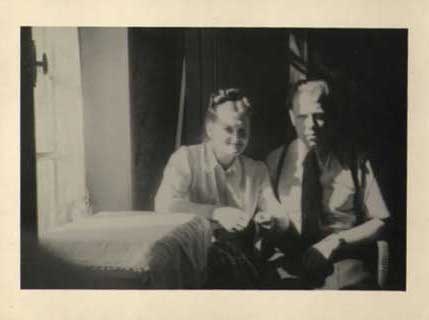| About Us | Legal | Contact Us |
Copyright © 2002-2021 Cogitec / All Rights Reserved
Goodbye Bernadette Pekss (1910-2002)
The life of Bernadette Pekss is quite a story too. This extremely brave and courageous woman, gave more than ten years of her life, to support her husband Zanis Waldheims, obsessed by the desire to change the world by awakening the sleepy consciousnesses of the human beings abused by words. Ten years of sacrifices and hard working, where the couple lived almost in poverty, and the psychological harassment of their relatives, even from the other Latvian living in Montreal Canada. They were two exceptional human beings, two artists in their own way, that fate had made them meet in Paris France in 1949. Here is a brief resumé of the important moments of the life of this exceptional woman, without whom Zanis Waldheims would never have developed his purely abstract art, and his approach to knowledge and meaning. In autumn 1944, because of the war rageing in Europe, and in her small country Latvia, she and other members of her family (mother, oldest brother, and two sisters), had to flee their native province (Latgale) on the east part of the country that shared a common frontier with the USSR. They went westward to flee the coming of the communist army marching towards the west. Her father had just died in his barn from the bombing launched by the communist who bombarded the German positions in the region. She was also leaving behind, her husband Zanis Gorbunov, who had been enlisted by force to join the SS Letts for the German army, to go and fight on the communist front, of what became in the history, the famous battle of Stalingrad, where the German army was defeated, and their soldiers put in prison for five years after the war. Her husband, once out of prison, completely broken, and not being able to go West to join her and live in the free countries, remarried with a schoolteacher. They had a girl, Aria. Bernadette, hoped till the end, to see him again after all these years. Her first husband, died at the end of the 50s. Young, he was an artist.
Bernadette thus had to run away with her family in the autumn of 1944, her mother, her older brother who was catholic priest, and his two younger sisters. Bernadette’s five brothers, did not have the same chance to flee Latvia, as they were caught up by war as soldiers. Some of her brothers died during the war, one of them was sent to an extermination camp in Siberia (Gulags). But he survived even after spending ten years underground working in a mine. The small group thus boarded ship in Liepaya, at the extreme west end of the country still in the hands of the German army, and went to Germany, where her elder brother had contacts with the Roman Catholic Church of Germany. They went in the region of Muldorf in Bavaria, where she worked during some years. Her brave mother died there.
In 1948, she went to work as a –domestique- in a family in Paris France. The head of the family, was an ex officer from the French aviation. She will live there certainly, one of the most beautiful periods of her life, so much she is liked, and respected by the family which had several young children. On June 24th, 1949, she met Zanis Waldheims during a Latvian feast similar to the holiday of St-John’s the Baptist in Quebec Canada. They became friends, and started to see each other. They visited the greater Paris, practicing their French as much as they could.
Zanis Waldheims emigrated to Canada in February 1952, and in June 1953, Bernadette joined him. After a brief holiday, she found a job as a dressmaker in a clothe factory, which exploited the immigrant women arrived in big number after the war. She will be torn in her deep Christian faith, by the fact that her priest brother, and other members of his family then living in France, blamed her for living in an union not blessed by the church, and whom their respective spouses were still living. Zanis’s first wife with her two children lived in Grand Rapids Michigan USA, and Bernadette's husband lived in Riga. Was it normal to ask any person – for moral reasons - to return and live with a husband or a spouse into a Communist country as Latvia was. In 1954, with the help of Zanis and Bernadette, and in spite of the great tensions with her family members, they helped them to migrate to Canada.
In 1962, Bernadette will be the only one to provide with the incomes for the couple. That year, Zanis decided to abandon his work -where he had worked for the last ten years as a maneuver- to dedicate himself full-time, to explore and explain his ideas on the geometrical abstraction concepts. He wanted to work on his ideas, and his philosophy which aimed at awakening the sleepy consciousness of the human beings abused by words that promise everthing and deliver only blood shed. She will support this load for ten consecutive years, without complaining, that is, until Zanis returned to work in 1972, as the mail man in a big construction and ship repair company in Montreal.
Besides living during ten years in the total insecurity, even in poverty, she had to bear the stress which came from the pounding moral of her catholic priest brother, and members of her family now living in Montreal. They are furious against her to bear this -artist- person. Zanis is the black sheep of the family, and also from the Latvian living in Montreal. What a pressure they had to support during all those years, in a time, when it was morally bad to live a common life without being married. In spite of the reproaches coming from everywhere, she does not break or back off. Zanis comes to lecture his priest brother-in-law, to ask him to stop his harassment towards Bernadette. To the moral reproaches of his brother-in-law, Zanis answers back by telling him, that he had no morality to get from him, because in his case, he had abandoned all the members of his parish in Latvia to flee the communists.
In spite of her respiratory problems and of her nervous asthma attacks, which takes her to the hospital rather often, she does not break. She has no choice. Her links with her family will thus be to the bare minimum. To silent about the gossips, they got married in an Anglican Church in 1963.
In 1978, she retires with a small pension. She devotes then to her favorite leisure, oil painting and poetry. She takes classes in painting given by her social club at the factory. She copies almost to perfection the French impressionists, and her professor buys from her many of her works so much they are good. She sells some of her works in amateur exhibitions, but she gives quite a few to her niece and nephew. She also devotes time to write poems in the pure Latvian.
In 1988, after 44 years out of her country, she makes a trip to Latvia accompanied by one of her sisters. She will meet Aria, the daughter of her first husband Zanis Gorbunov, and a correspondence is established between the two.
On March 13th, 1993, during a very big snowstorm, Bernadette and Zanis will get married according to the rites of the Roman Catholic Church, in the church St-Louis de France in Montreal. On July 19th her Zanis died from a cancer at the age of 83. She will remain alone in her apartment on Colonial street for several years. She will have a pleasant life with several social activities held at the Latvian cultural center in Lachine Quebec, of which she goes regularly by bus and the subway. The tensions between her priest brother are gone.
In 1998, she enters a retirement home for the elderly person, north of Colonial street, the street on which she had lived between 1958 and 1998. Her only faithful visitor, since 1993, is me Yves Jeanson, the friend of her husband Zanis for nineteen years. With Bernadette's permission, I collected all the possible documentation of what Zanis had left at his death: all the books of his library, his notes, his photos, some of his letters, his personal papers, especially his precious diary in which one can read from 1954 till 1993, the intellectual struggles of a thinker, humanist and artist.
On June 23rd 2002, Bernadette Pekss died of cancer. She is buried at the same place as her husband Zanis in the cemetery of the Côte des Neiges in Montreal.-----Bernadette Pekss was a sweet, generous and very independent woman. She was used to solitude, even if it is difficult to live as sometimes she complained about it, especially during the last six months of her life. She had little intimate contact with her sister who lived in the same retirement home.
I visited her regularly, called her as often as I could. I was his only confidant, and our relations were good and cordial. In her testament, she bequeathed me all the drawings of her late husband Zanis Waldheims.
Goodbye Bernadette,
No, I shall never forget you.
By Yves Jeanson, July 2009
Bernadette Pekss wife of Zanis Waldheims

